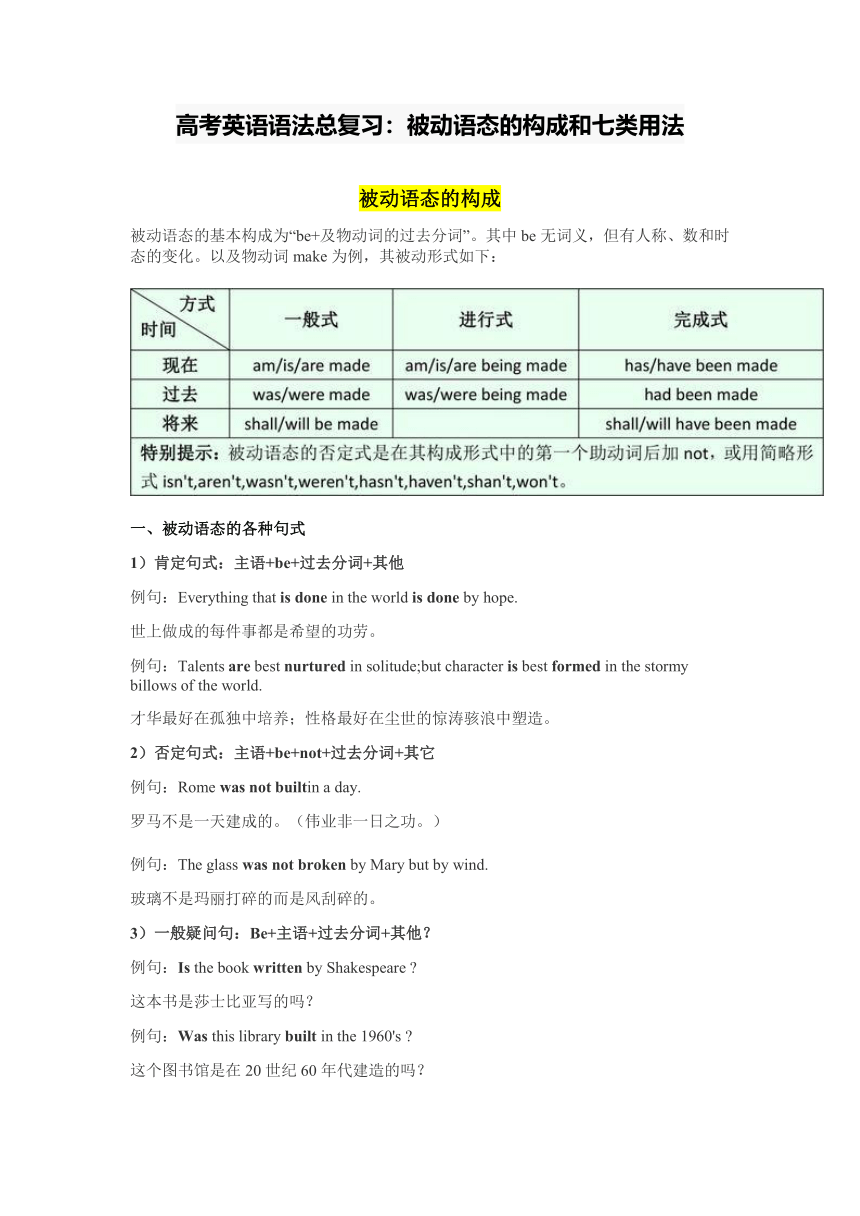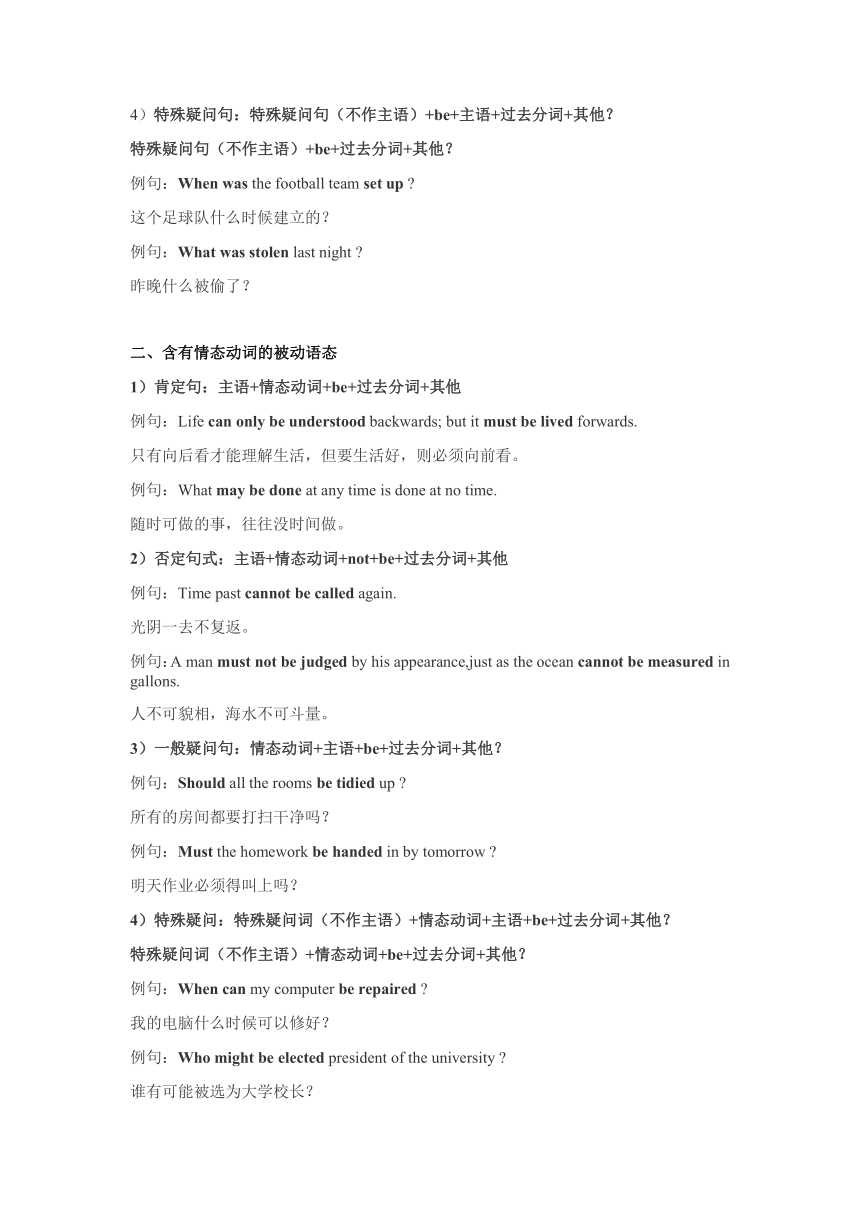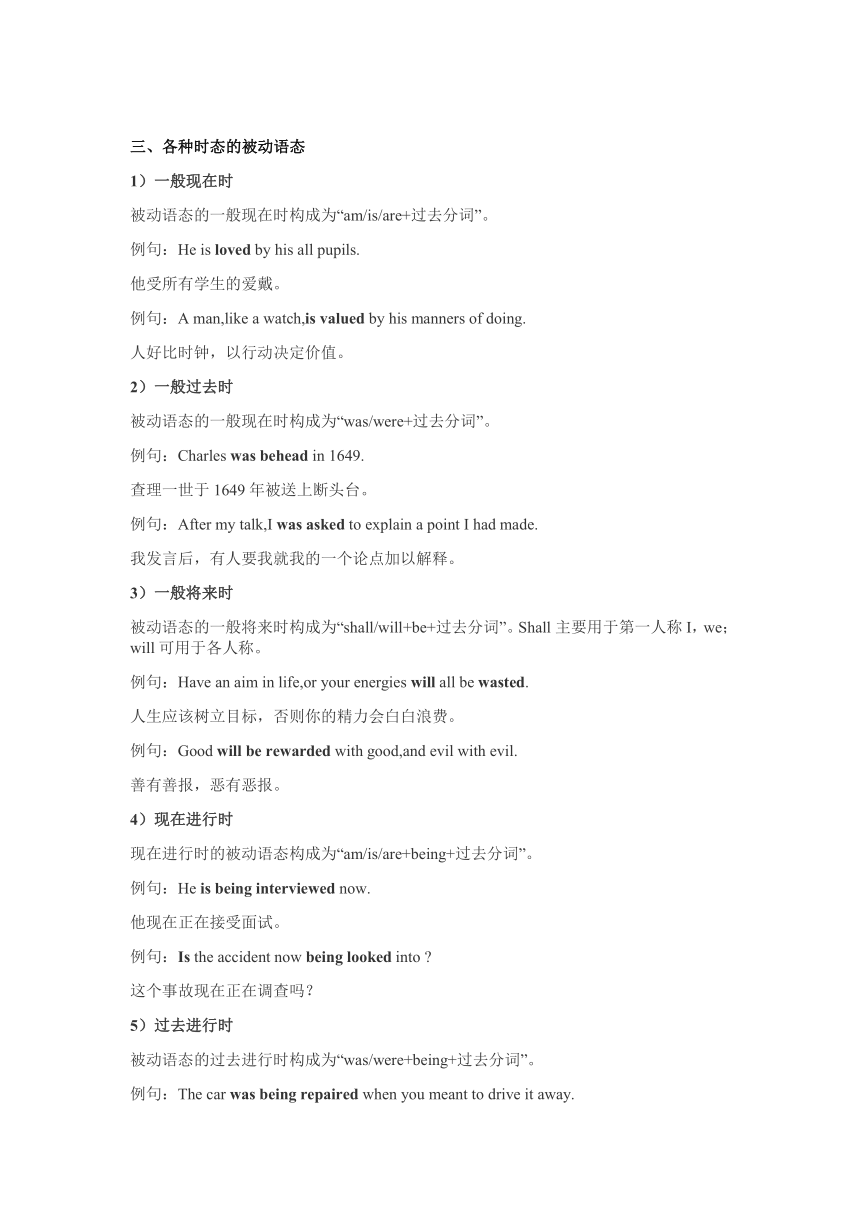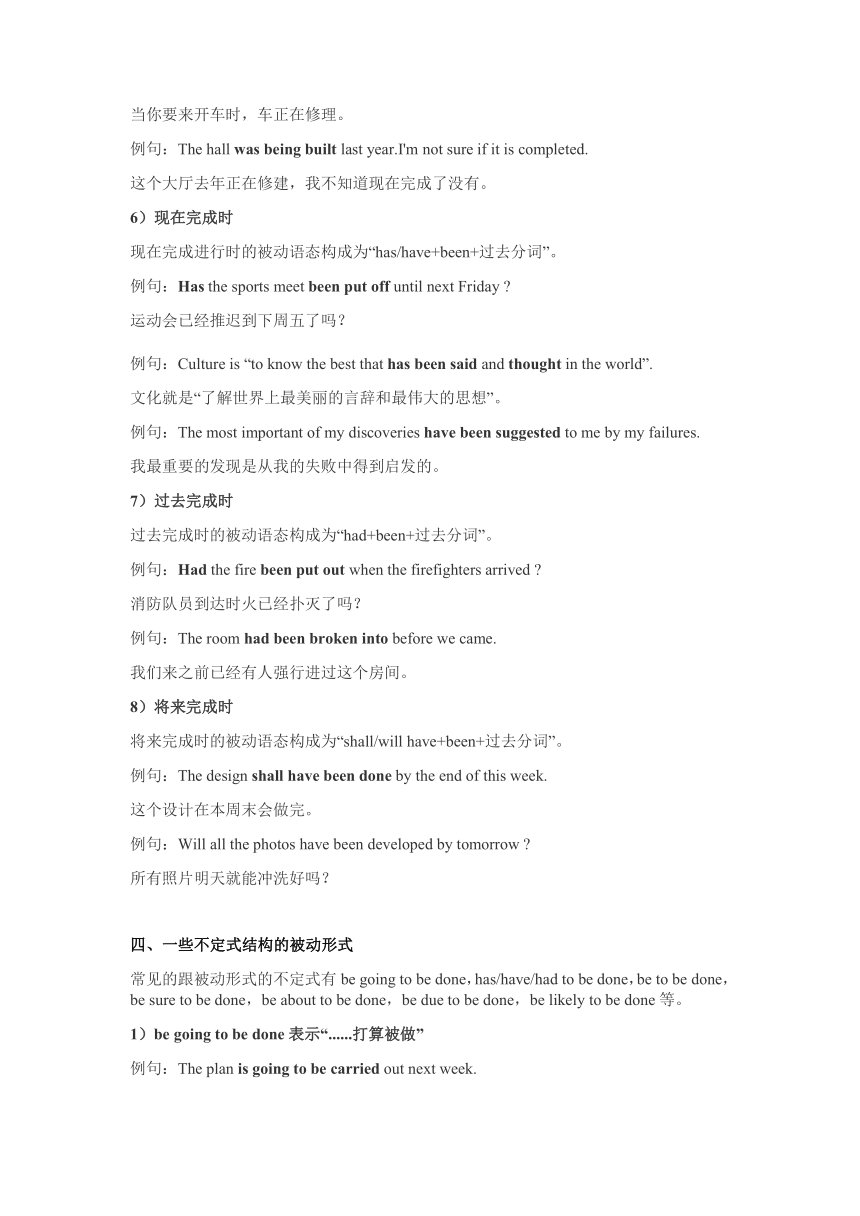2022届高考英语二轮复习:被动语态的构成和七类用法学案
文档属性
| 名称 | 2022届高考英语二轮复习:被动语态的构成和七类用法学案 |  | |
| 格式 | doc | ||
| 文件大小 | 85.5KB | ||
| 资源类型 | 教案 | ||
| 版本资源 | 通用版 | ||
| 科目 | 英语 | ||
| 更新时间 | 2021-11-20 21:45:58 | ||
图片预览




文档简介
高考英语语法总复习:被动语态的构成和七类用法
被动语态的构成
被动语态的基本构成为“be+及物动词的过去分词”。其中be无词义,但有人称、数和时态的变化。以及物动词make为例,其被动形式如下:
一、被动语态的各种句式
1)肯定句式:主语+be+过去分词+其他
例句:Everything that is done in the world is done by hope.
世上做成的每件事都是希望的功劳。
例句:Talents are best nurtured in solitude;but character is best formed in the stormy billows of the world.
才华最好在孤独中培养;性格最好在尘世的惊涛骇浪中塑造。
2)否定句式:主语+be+not+过去分词+其它
例句:Rome was not builtin a day.
罗马不是一天建成的。(伟业非一日之功。)
例句:The glass was not broken by Mary but by wind.
玻璃不是玛丽打碎的而是风刮碎的。
3)一般疑问句:Be+主语+过去分词+其他?
例句:Is the book written by Shakespeare
这本书是莎士比亚写的吗?
例句:Was this library built in the 1960's
这个图书馆是在20世纪60年代建造的吗?
4)特殊疑问句:特殊疑问句(不作主语)+be+主语+过去分词+其他?
特殊疑问句(不作主语)+be+过去分词+其他?
例句:When was the football team set up
这个足球队什么时候建立的?
例句:What was stolen last night
昨晚什么被偷了?
二、含有情态动词的被动语态
1)肯定句:主语+情态动词+be+过去分词+其他
例句:Life can only be understood backwards; but it must be lived forwards.
只有向后看才能理解生活,但要生活好,则必须向前看。
例句:What may be done at any time is done at no time.
随时可做的事,往往没时间做。
2)否定句式:主语+情态动词+not+be+过去分词+其他
例句:Time past cannot be called again.
光阴一去不复返。
例句:A man must not be judged by his appearance,just as the ocean cannot be measured in gallons.
人不可貌相,海水不可斗量。
3)一般疑问句:情态动词+主语+be+过去分词+其他?
例句:Should all the rooms be tidied up
所有的房间都要打扫干净吗?
例句:Must the homework be handed in by tomorrow
明天作业必须得叫上吗?
4)特殊疑问:特殊疑问词(不作主语)+情态动词+主语+be+过去分词+其他?
特殊疑问词(不作主语)+情态动词+be+过去分词+其他?
例句:When can my computer be repaired
我的电脑什么时候可以修好?
例句:Who might be elected president of the university
谁有可能被选为大学校长?
三、各种时态的被动语态
1)一般现在时
被动语态的一般现在时构成为“am/is/are+过去分词”。
例句:He is loved by his all pupils.
他受所有学生的爱戴。
例句:A man,like a watch,is valued by his manners of doing.
人好比时钟,以行动决定价值。
2)一般过去时
被动语态的一般现在时构成为“was/were+过去分词”。
例句:Charles was behead in 1649.
查理一世于1649年被送上断头台。
例句:After my talk,I was asked to explain a point I had made.
我发言后,有人要我就我的一个论点加以解释。
3)一般将来时
被动语态的一般将来时构成为“shall/will+be+过去分词”。Shall主要用于第一人称I,we;will可用于各人称。
例句:Have an aim in life,or your energies will all be wasted.
人生应该树立目标,否则你的精力会白白浪费。
例句:Good will be rewarded with good,and evil with evil.
善有善报,恶有恶报。
4)现在进行时
现在进行时的被动语态构成为“am/is/are+being+过去分词”。
例句:He is being interviewed now.
他现在正在接受面试。
例句:Is the accident now being looked into
这个事故现在正在调查吗?
5)过去进行时
被动语态的过去进行时构成为“was/were+being+过去分词”。
例句:The car was being repaired when you meant to drive it away.
当你要来开车时,车正在修理。
例句:The hall was being built last year.I'm not sure if it is completed.
这个大厅去年正在修建,我不知道现在完成了没有。
6)现在完成时
现在完成进行时的被动语态构成为“has/have+been+过去分词”。
例句:Has the sports meet been put off until next Friday
运动会已经推迟到下周五了吗?
例句:Culture is “to know the best that has been said and thought in the world”.
文化就是“了解世界上最美丽的言辞和最伟大的思想”。
例句:The most important of my discoveries have been suggested to me by my failures.
我最重要的发现是从我的失败中得到启发的。
7)过去完成时
过去完成时的被动语态构成为“had+been+过去分词”。
例句:Had the fire been put out when the firefighters arrived
消防队员到达时火已经扑灭了吗?
例句:The room had been broken into before we came.
我们来之前已经有人强行进过这个房间。
8)将来完成时
将来完成时的被动语态构成为“shall/will have+been+过去分词”。
例句:The design shall have been done by the end of this week.
这个设计在本周末会做完。
例句:Will all the photos have been developed by tomorrow
所有照片明天就能冲洗好吗?
四、一些不定式结构的被动形式
常见的跟被动形式的不定式有be going to be done,has/have/had to be done,be to be done,be sure to be done,be about to be done,be due to be done,be likely to be done等。
1)be going to be done表示“......打算被做”
例句:The plan is going to be carried out next week.
这个计划准备下周执行。
例句:George is going to be promoted.
乔治将要升职。
2)has/have/had to be done表示“不得不被做”
例句:The news has to be kept secret.
这个消息必须保密。
例句:The work will have to be done with great care.
必须十分谨慎地完成这项工作。
3)be to be done表示“按照计划、规定、要求或必须被做”
例句:Nothing in life is to be feared.It is only to be understood.
世界上没有什么可怕的东西,只有待理解的东西。
4)be sure to be done表示“一定会被做”
例句:These difficulties are sure to be overcome.
这些困难一定会被克服。
例句:This problem is sure to be considered as the most serious.
这个问题一定会被当作最严重的事来看待。
5)be about to be done表示“眼下将要被做”
例句:The car is about to be repaired.
这辆汽车马上就要修了。
例句:The work is about to be finished.
工作马上就完成了。
6)be due to be done表示“按期将要被做”
例句:The meeting is due to be held in Saturday.
会议将于本周六举行。
例句:The electricity bill is due to be paid soon.
很快就要交电费了。
7)be likely to be done表示“很快可能会被做”
例句:The work is likely to be finished today.
这项工作今天可能会做完。
例句:The factory is likely to be closed down.
这家工厂可能会被关闭。
被动语态的用法
一般说来,主动与被动的选用,应根据具体的情况而定。一般情况下,主动结构用得比较多,也比较自然。下面几种情况一般用被动语态。
(一)不知或不必提及动作的执行者
不知道或不必知道提到动作的执行者是谁时,常用被动语态。
例句:Gold is tried in the fire.
黄金不怕火炼。
例句:The streets are swept every day.
马路每天都清扫。
例句:When will the result be announced
结果什么时候宣布。
例句:Men are known by their companions.
观其友而知其人。
Don't say “no” till you are asked.
别人还没有求你,不要先说“不行”。
(二)强调动作的承受者
当强调动作的承受者,将承受者作为谈话的中心时用被动语态。这类句子常有一个by引导的短语说明动作的执行者,有时也可没有。
例句:The plan was successfully carried out.
这个计划施行的很成功。
例句:Many houses were destroyed in the war.
很多房子在战争中毁坏。
例句:He that makes himself a sheep shall be eaten by the wolf.
甘为羔羊,定为狼食。
例句:Some people do not use money,instead they are used by money.
有的人不是用钱,而是为钱所用。
(三)动作的执行者很模糊
当动作的执行者是泛指时(如people,one等),常用被动语态。
例句:It is believed that the task will be completed successfully.
人们坚信能成功地完成这项任务。
例句:He is suspected of robbing the bank.
有人怀疑他抢劫银行。
例句:The letter has been opened.
这信被人拆开了。
(四)礼貌的需要,避免说出动作的执行者
有时出于礼貌,不便提到动作的执行者,此时用被动语态。动作的执行者有可能是别人也有可能是自己。
例句:My diary book has been opened.
我的日记被人看了。
例句:You are cordially invited to the ceremony.
热忱邀请阁下参加这次典礼。
例句:The window glass was broken this morning.
今天早上窗户被人打碎了。
例句:I have been told many times not to make noises.
有人多次告诉我不要吵闹。
例句:It is hoped that such things would not happen again.
希望这样的事不要再发生。
(五)为使句子更加合理、流畅
有时为了使句子保持平衡,常用被动语态,从而使语句更加流畅。
例句:The plan was supported by those who wish to live on the campus.
这项计划受到想住在校园住宅区的人的支持。
例句:He appeared on the stage and was warmly applauded by the audience.
他在台上出现,受到观众的热烈欢迎。
例句:All these advertisements were made by our company.
所有这些广告都是我们公司做的。
(六)公告、新闻报道、报纸标贴、科技文章中
在公告、通知、新闻报道、报纸标题(其中的be常省略)、科技文章中常用被动语态。
例句:Smoking is strictly prohibited here.
此处严禁吸烟。(公告)
例句:Five-year-old Boys (Were) Kidnapped.
若干名五岁大的男孩遭绑架。(新闻标题)
例句:The mixture is placed in a crucible and is heated to a temperature of 300℃。It is then allowed to cool before it can be analyzed.
将混合液置于坩埚中,加热至摄氏300度,然后令其冷却,便可进行分析。
(七)习惯用法的需要
有些习惯用法只以或常以被动形式出现。
例句:She was seated by the window.
她坐在窗户旁。
例句:I am determined to do better than Mike.
我决心要比迈克做得好。
例句:Every spare moment was devoted to study.
每一点空余时间都用在学习上了。
例句:Age has nothing to do with years.Some men are born old,some never grow old.
年龄与岁月无关。有人生来就老气横秋,有人却永远年轻。
例句:My hometown is situated in southern Shandong Province.
我的家乡坐落在山东省南部。
例句:An archaeologist is the best husband any woman can have:the older she gets,the more interested he is in her.
对任何女人而言,考古学家是最佳的丈夫人选:因为她越老,他对她越感兴趣。
被动语态的构成
被动语态的基本构成为“be+及物动词的过去分词”。其中be无词义,但有人称、数和时态的变化。以及物动词make为例,其被动形式如下:
一、被动语态的各种句式
1)肯定句式:主语+be+过去分词+其他
例句:Everything that is done in the world is done by hope.
世上做成的每件事都是希望的功劳。
例句:Talents are best nurtured in solitude;but character is best formed in the stormy billows of the world.
才华最好在孤独中培养;性格最好在尘世的惊涛骇浪中塑造。
2)否定句式:主语+be+not+过去分词+其它
例句:Rome was not builtin a day.
罗马不是一天建成的。(伟业非一日之功。)
例句:The glass was not broken by Mary but by wind.
玻璃不是玛丽打碎的而是风刮碎的。
3)一般疑问句:Be+主语+过去分词+其他?
例句:Is the book written by Shakespeare
这本书是莎士比亚写的吗?
例句:Was this library built in the 1960's
这个图书馆是在20世纪60年代建造的吗?
4)特殊疑问句:特殊疑问句(不作主语)+be+主语+过去分词+其他?
特殊疑问句(不作主语)+be+过去分词+其他?
例句:When was the football team set up
这个足球队什么时候建立的?
例句:What was stolen last night
昨晚什么被偷了?
二、含有情态动词的被动语态
1)肯定句:主语+情态动词+be+过去分词+其他
例句:Life can only be understood backwards; but it must be lived forwards.
只有向后看才能理解生活,但要生活好,则必须向前看。
例句:What may be done at any time is done at no time.
随时可做的事,往往没时间做。
2)否定句式:主语+情态动词+not+be+过去分词+其他
例句:Time past cannot be called again.
光阴一去不复返。
例句:A man must not be judged by his appearance,just as the ocean cannot be measured in gallons.
人不可貌相,海水不可斗量。
3)一般疑问句:情态动词+主语+be+过去分词+其他?
例句:Should all the rooms be tidied up
所有的房间都要打扫干净吗?
例句:Must the homework be handed in by tomorrow
明天作业必须得叫上吗?
4)特殊疑问:特殊疑问词(不作主语)+情态动词+主语+be+过去分词+其他?
特殊疑问词(不作主语)+情态动词+be+过去分词+其他?
例句:When can my computer be repaired
我的电脑什么时候可以修好?
例句:Who might be elected president of the university
谁有可能被选为大学校长?
三、各种时态的被动语态
1)一般现在时
被动语态的一般现在时构成为“am/is/are+过去分词”。
例句:He is loved by his all pupils.
他受所有学生的爱戴。
例句:A man,like a watch,is valued by his manners of doing.
人好比时钟,以行动决定价值。
2)一般过去时
被动语态的一般现在时构成为“was/were+过去分词”。
例句:Charles was behead in 1649.
查理一世于1649年被送上断头台。
例句:After my talk,I was asked to explain a point I had made.
我发言后,有人要我就我的一个论点加以解释。
3)一般将来时
被动语态的一般将来时构成为“shall/will+be+过去分词”。Shall主要用于第一人称I,we;will可用于各人称。
例句:Have an aim in life,or your energies will all be wasted.
人生应该树立目标,否则你的精力会白白浪费。
例句:Good will be rewarded with good,and evil with evil.
善有善报,恶有恶报。
4)现在进行时
现在进行时的被动语态构成为“am/is/are+being+过去分词”。
例句:He is being interviewed now.
他现在正在接受面试。
例句:Is the accident now being looked into
这个事故现在正在调查吗?
5)过去进行时
被动语态的过去进行时构成为“was/were+being+过去分词”。
例句:The car was being repaired when you meant to drive it away.
当你要来开车时,车正在修理。
例句:The hall was being built last year.I'm not sure if it is completed.
这个大厅去年正在修建,我不知道现在完成了没有。
6)现在完成时
现在完成进行时的被动语态构成为“has/have+been+过去分词”。
例句:Has the sports meet been put off until next Friday
运动会已经推迟到下周五了吗?
例句:Culture is “to know the best that has been said and thought in the world”.
文化就是“了解世界上最美丽的言辞和最伟大的思想”。
例句:The most important of my discoveries have been suggested to me by my failures.
我最重要的发现是从我的失败中得到启发的。
7)过去完成时
过去完成时的被动语态构成为“had+been+过去分词”。
例句:Had the fire been put out when the firefighters arrived
消防队员到达时火已经扑灭了吗?
例句:The room had been broken into before we came.
我们来之前已经有人强行进过这个房间。
8)将来完成时
将来完成时的被动语态构成为“shall/will have+been+过去分词”。
例句:The design shall have been done by the end of this week.
这个设计在本周末会做完。
例句:Will all the photos have been developed by tomorrow
所有照片明天就能冲洗好吗?
四、一些不定式结构的被动形式
常见的跟被动形式的不定式有be going to be done,has/have/had to be done,be to be done,be sure to be done,be about to be done,be due to be done,be likely to be done等。
1)be going to be done表示“......打算被做”
例句:The plan is going to be carried out next week.
这个计划准备下周执行。
例句:George is going to be promoted.
乔治将要升职。
2)has/have/had to be done表示“不得不被做”
例句:The news has to be kept secret.
这个消息必须保密。
例句:The work will have to be done with great care.
必须十分谨慎地完成这项工作。
3)be to be done表示“按照计划、规定、要求或必须被做”
例句:Nothing in life is to be feared.It is only to be understood.
世界上没有什么可怕的东西,只有待理解的东西。
4)be sure to be done表示“一定会被做”
例句:These difficulties are sure to be overcome.
这些困难一定会被克服。
例句:This problem is sure to be considered as the most serious.
这个问题一定会被当作最严重的事来看待。
5)be about to be done表示“眼下将要被做”
例句:The car is about to be repaired.
这辆汽车马上就要修了。
例句:The work is about to be finished.
工作马上就完成了。
6)be due to be done表示“按期将要被做”
例句:The meeting is due to be held in Saturday.
会议将于本周六举行。
例句:The electricity bill is due to be paid soon.
很快就要交电费了。
7)be likely to be done表示“很快可能会被做”
例句:The work is likely to be finished today.
这项工作今天可能会做完。
例句:The factory is likely to be closed down.
这家工厂可能会被关闭。
被动语态的用法
一般说来,主动与被动的选用,应根据具体的情况而定。一般情况下,主动结构用得比较多,也比较自然。下面几种情况一般用被动语态。
(一)不知或不必提及动作的执行者
不知道或不必知道提到动作的执行者是谁时,常用被动语态。
例句:Gold is tried in the fire.
黄金不怕火炼。
例句:The streets are swept every day.
马路每天都清扫。
例句:When will the result be announced
结果什么时候宣布。
例句:Men are known by their companions.
观其友而知其人。
Don't say “no” till you are asked.
别人还没有求你,不要先说“不行”。
(二)强调动作的承受者
当强调动作的承受者,将承受者作为谈话的中心时用被动语态。这类句子常有一个by引导的短语说明动作的执行者,有时也可没有。
例句:The plan was successfully carried out.
这个计划施行的很成功。
例句:Many houses were destroyed in the war.
很多房子在战争中毁坏。
例句:He that makes himself a sheep shall be eaten by the wolf.
甘为羔羊,定为狼食。
例句:Some people do not use money,instead they are used by money.
有的人不是用钱,而是为钱所用。
(三)动作的执行者很模糊
当动作的执行者是泛指时(如people,one等),常用被动语态。
例句:It is believed that the task will be completed successfully.
人们坚信能成功地完成这项任务。
例句:He is suspected of robbing the bank.
有人怀疑他抢劫银行。
例句:The letter has been opened.
这信被人拆开了。
(四)礼貌的需要,避免说出动作的执行者
有时出于礼貌,不便提到动作的执行者,此时用被动语态。动作的执行者有可能是别人也有可能是自己。
例句:My diary book has been opened.
我的日记被人看了。
例句:You are cordially invited to the ceremony.
热忱邀请阁下参加这次典礼。
例句:The window glass was broken this morning.
今天早上窗户被人打碎了。
例句:I have been told many times not to make noises.
有人多次告诉我不要吵闹。
例句:It is hoped that such things would not happen again.
希望这样的事不要再发生。
(五)为使句子更加合理、流畅
有时为了使句子保持平衡,常用被动语态,从而使语句更加流畅。
例句:The plan was supported by those who wish to live on the campus.
这项计划受到想住在校园住宅区的人的支持。
例句:He appeared on the stage and was warmly applauded by the audience.
他在台上出现,受到观众的热烈欢迎。
例句:All these advertisements were made by our company.
所有这些广告都是我们公司做的。
(六)公告、新闻报道、报纸标贴、科技文章中
在公告、通知、新闻报道、报纸标题(其中的be常省略)、科技文章中常用被动语态。
例句:Smoking is strictly prohibited here.
此处严禁吸烟。(公告)
例句:Five-year-old Boys (Were) Kidnapped.
若干名五岁大的男孩遭绑架。(新闻标题)
例句:The mixture is placed in a crucible and is heated to a temperature of 300℃。It is then allowed to cool before it can be analyzed.
将混合液置于坩埚中,加热至摄氏300度,然后令其冷却,便可进行分析。
(七)习惯用法的需要
有些习惯用法只以或常以被动形式出现。
例句:She was seated by the window.
她坐在窗户旁。
例句:I am determined to do better than Mike.
我决心要比迈克做得好。
例句:Every spare moment was devoted to study.
每一点空余时间都用在学习上了。
例句:Age has nothing to do with years.Some men are born old,some never grow old.
年龄与岁月无关。有人生来就老气横秋,有人却永远年轻。
例句:My hometown is situated in southern Shandong Province.
我的家乡坐落在山东省南部。
例句:An archaeologist is the best husband any woman can have:the older she gets,the more interested he is in her.
对任何女人而言,考古学家是最佳的丈夫人选:因为她越老,他对她越感兴趣。
